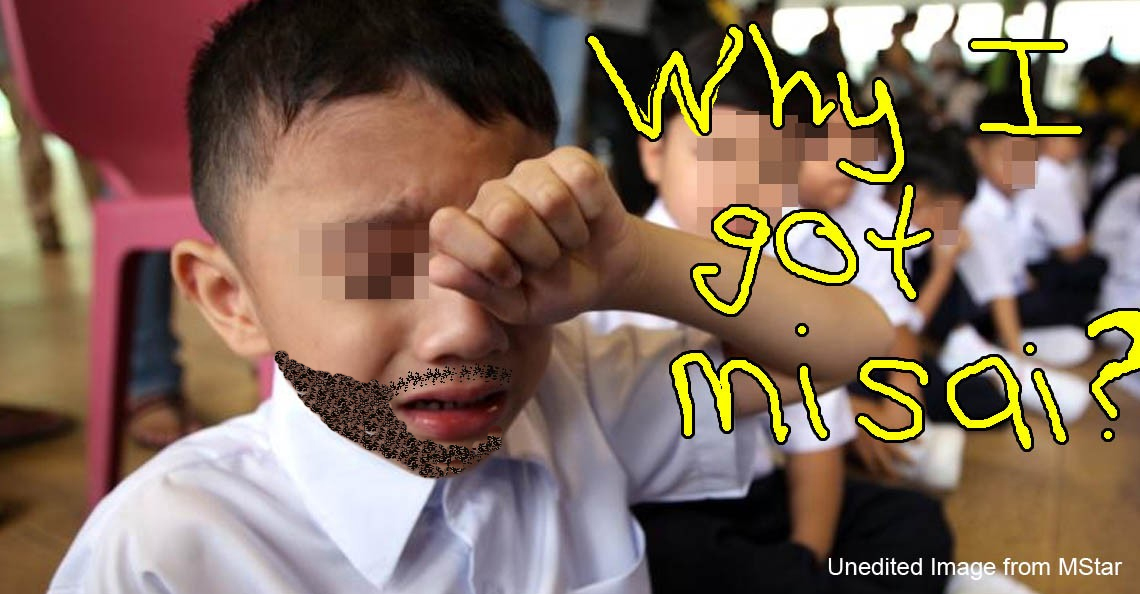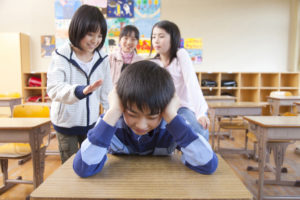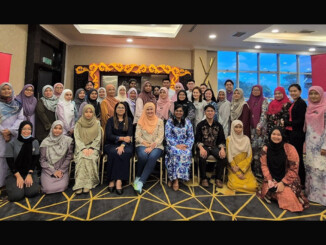This rare condition makes some Malaysian kids reach puberty when they’re in Standard 2

- 362Shares
- Facebook336
- Twitter1
- LinkedIn2
- Email4
- WhatsApp19
Before we begin, let’s take a poll…
Whenever we read a news story that tells us that an average of 18000 teenage girls fall pregnant every year or a CILISOS article about Sekolah Harapan for pregnant teens, you might be guessing that they’re secondary school students… Right? Maybe around 13-17 years old?
But have you heard of the 11-year old Bahau-based girl who might have become the “youngest mother” in Malaysian history (in 2015)? Or about a 9-year old Penangite girl who gave birth (in 2010)? Just when we thought that young mothers can’t get any younger, we came across a true story of a 5-year old Peruvian girl who became the world’s youngest mother in 1939!
Now, you may wonder how it’s even possible for their bodies to start conceiving.
There’s a name for this condition… and it’s called ‘precocious puberty’. Preco-what?
It’s precocious, not “precautious”. Clique Clinic and Puberty Too Early say that puberty is the transition between childhood and adulthood. Most of us get it around 12 or 13 years old. But there are some who get it MUCH SOONER like before 8 or 9 years old, and that is precocious/early puberty.
In fact, we even read about this 2-year-old:
“At the age of four months old, he looked like a child aged one and by the time he turned one he looked like his three-year-old cousin. We thought he was growing faster than other children. But our worries increased when we noticed his pubic hair and genitals growing unnaturally after around 18 months.” – says mother of a 2-year old boy with precocious puberty.
OMG. But how?! First off, let’s look at how puberty begins for everyone.
The brain makes the Gn-R hormone to tell the pituitary gland to release the L hormone and FS hormone. Then, these two hormones tell the ovaries in girls to make oestrogen and the testicles in boys to make testosterone. Because of these sex hormones (oestrogen and testosterone, just to be clear), physical changes slowly appear and BOOM! Puberty!
For both genders, the common symptoms to watch out for are mood swings, acne/oily skin, underarm hair, pubic hair, body odour and growth spurt. Aiyoyo… Other symptoms depend on the child’s physiological gender. For girls, they’re breast growth and menstruation. And for boys, they’re facial hair, deepening of voice, and testicle and penis growth. (Girls have moustaches too but they’re just much less noticeable.)

There are 2 types of precocious puberty, depending on how they occur lah. One is central precocious puberty (CPP) and the other one is peripheral precocious puberty (PPP).
Generally, doctors cannot identify the cause for CPP. But sometimes, it could be caused by problems related to the brain and spinal cord – aka central nervous system (CNS) – such as a tumour in or radiation/injury to the CNS, a brain defect, McCune-Albright Syndrome, congenital adrenal hyperplasia and hypothyroidism.
PPP pulak is caused by hormone-related occurrences. Ovarian cysts and tumours in girls as well as germ cell and Leydig cell tumours and familial male-limited precocious puberty in boys can also cause PPP. For both boys and girls, it could be caused by a tumour in the glands that secrete sex hormones or exposure to… everyday products containing sex hormones (or “endocrine disruptors“).
Yea we were shocked too. Turns out, many everyday products such as plastics, detergents, cosmetics and injected meat have endocrine disruptors that mimic oestrogen and cause kids that come into contact with it to reach puberty earlier (more on this later).
But beyond that, some genetic and environmental factors can also increase the risk of a child experiencing puberty earlier, like being a girl (studies have shown that girls have a higher chance of getting it than boys), obesity, and stress triggered by childhood abuse or changes in the home environment.

These kids may have a tougher time growing up…
Thought your childhood was bad? Well… Imagine being one of these kids. There are a number of problems that these kids typically face, one of it being shorter adult height. They may seem really tall at first due to the growth spurt, but later on, they stop growing earlier than usual. WHY LIDDAT ONE? Because the growth hormones stimulate bone growth too early and quickly. A lady shares her experience:
“I stole a razor from my dad so I could shave the hair away whenever it started to grow back. I was terrified someone would see me naked and think that something was wrong with me, the same way I did. I was also tall compared to most of my classmates, towering over them before I stopped growing at 11.” – says Kelley O’Brien, a writer at HelloFlo.
They’re also more likely to suffer from health problems later in life like higher blood pressure and cardiovascular diseases. But what’s worse is, IF the girls get pregnant at such a young age, there’s a higher chance that they’d die from childbirth compared to older women. 🙁
Despite the early physical maturation, they do not mentally mature as soon as they hit puberty, so they dunno how to handle tough situations. And because they’re still kids mentally, their self-esteem can easily be shaken by how society treats them (harassment and body shaming) and the shocking changes in their bodies.

Indirectly, this can lead to problems like depression, substance abuse, eating disorders, risky behaviour, objectified body consciousness, negative self image, and bad relationships with other people… which brings us to our next point.
The bigger threat is… child predators.
While there are a lot of concerns and outrage over pedophilia and grooming (CILISOS has covered the grooming issue two years ago), not much is spoken about HEBEPHILIA here in Malaysia.
They sound same-same, so what’s the difference between pedophilia and hebephilia? Pedophiles are sexually attracted to children with no physical symptoms of puberty while hebephiles are sexually attracted to children or early teens with physical symptoms of puberty.
“Being a naive child with breasts left me vulnerable and where there is prey, there is a predator. I was abused from the age of 9 till 13 by two men, who were ostensibly our “family friends”.” – says DA in an anonymous post on a Facebook page Individuality.

Actually, two reported cases of Malaysian hebephiles have made headlines in the past couple of years.
In 2015, a 30-something year old engineer, who may be the “worst predator of pubescent boys Singapore had seen”, was convicted for abusing at least 31 boys in Singapore! And then, in 2017, a middle-aged masseur was convicted for paying teenage boys in Singapore (again Singapore!) to have sex with him!
Their victims were around the age range of 11-15 years, which meant that the victims were already young teenagers, so yeah, both offenders were considered hebephilic. Unfortunately, they both knew how to take advantage of the poor boys’ naivety and lure them into their evil plans… But luckily, later, they were caught and dealt with. Really, it would have been worse if they weren’t caught since they both had high chances of reoffending!

Furthermore, the Shariah judges have the power to approve any child marriage if the child bride or groom has… Umm… Signs of puberty and maturity. Since Malaysian children are hitting puberty earlier as claimed by the National Population and Family Development Board (LPPKN), early-maturing children may be vulnerable to getting married off younger, so children’s rights activists are urging the authorities for stricter law enforcement to protect the children.
So, what to do? Medical experts give some suggestions.
Remember the products containing “endocrine disruptors“? You know, the ones that mimic oestrogen? Studies have shown that these chemicals including perfluorinated chemicals (PFCs) and bisphenol A (BPA) are linked to diseases such as thyroid disorders and polycystic ovary syndrome. Teflon, which is the trade name for a PFC and is commonly found in non-stick pans, causes irregular menstrual periods and infertility, among other problems.
The Environmental Working Group says that exposure to hormone-altering chemicals is one of the things that may increase a child’s chances of early puberty and they’re all over our home! So, to prevent this from happening while they’re still little, medical experts recommend keeping them away from these products (like hiding your medications in a place children cannot find) and use as little of these products as possible.

The experts also recommend encouraging and supporting them in maintaining a healthy and active lifestyle. Maybe feed them nutritious meals and take them out regularly for a sport or exercise to avoid obesity (as we said earlier, it increases the risk of early puberty).
But if you or your child spot any symptoms of early puberty, the advice is to talk to a doctor (or paediatrician or paediatric endocrinologist) about diagnosis and treatment options (like Gn-RH analogue therapy to delay puberty or treating an underlying medical condition like tumours).
Another crucial advice from the medical experts is getting psychological counselling and creating a home environment that fosters an open and supportive dialogue about the child’s experiences to help with coping.

This may be awkward for those involved but experts say that more can be done to improve our sex education. You can read more about Malaysia’s abstinence-only approach to sex education last year as well as this article by sexual health educator June Low about how people can discuss taboo subjects with kids.
UKM Professor of Law in Family, Women and Children, Prof Datuk Noor Aziah meanwhile said that the ministries and the media need to invest in better sex education so that young children are more prepared to face puberty. Currently, Soroptimist International and researcher Siti Aishah are working to educate primary school girls about puberty and sexual health, so that they understand their needs and make better decisions.
Another reason for providing better sex education is that young rape victims are also having a hard time asking for help and thus suffer in silence because they’re scared and don’t know what to do to get protection. Even if we’re not directly involved with parenting or taking care of children, we still have an obligation as fellow human beings to protect children.
- 362Shares
- Facebook336
- Twitter1
- LinkedIn2
- Email4
- WhatsApp19



